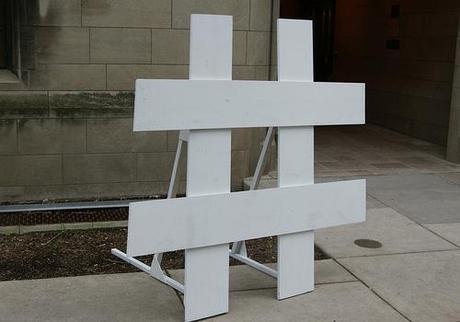 Many businesses are creating hashtags for use on Twitter in order to promote their goods or services, or even a special event or conference. These hashtags are typically used to promote something and part of their value, apart from brand identity, is the ability to search Twitter for tweets shared using that hashtag. It’s a smart business strategy and, like a tagline, logo or other branding or identity mark, it can be very useful as part of your online marketing efforts.
Many businesses are creating hashtags for use on Twitter in order to promote their goods or services, or even a special event or conference. These hashtags are typically used to promote something and part of their value, apart from brand identity, is the ability to search Twitter for tweets shared using that hashtag. It’s a smart business strategy and, like a tagline, logo or other branding or identity mark, it can be very useful as part of your online marketing efforts.
But what’s really important yet often overlooked by brands, agencies and business owners alike is the fact that smart business practices dictate that you should treat those hashtags like trademarks. Wonder why? Let’s start by looking at the definition of what a trademark is.
A trademark is an identifier of the quality of the goods or services and the source of those goods or services identified by the mark. In this case, the hashtag used on Twitter performs the exact same purpose. This means that there is a risk of trademark infringement or dilution by the use of a hashtag that is not first reviewed for possible confusion with other trademarks. In fact, it’s not unusual at all for a business to receive a cease-and-desist letter from an attorney because of hashtags used that conflict with other trademarks or hashtags. Many businesses are serious about protecting their brand marks (especially those which are trademarked) and won’t hesitate to send cease-and-desist letters and/or pursue legal remedies where necessary when they find someone misusing a trademarked item.
#HashtagPanic! How can I Avoid a #Conflict?
Without doing your due diligence on hashtags you intend to use to promote a business or event on Twitter (or elsewhere), there is certainly a risk involved. And when it comes to due diligence, a trademark search is the key. Let’s talk about why.
#Pitfalls: #Potential #Plaintiffs
A trademark search can help you identify possible plaintiffs. One of the things attorneys explore during a trademark search is whether it’s possible the proposed trademark might cause a likelihood of confusion with other trademarks that are already registered or in use. This is impossible to judge without a trademark search. Potential plaintiffs are those whose marks are either registered before your mark or in use before your mark. Many businesses unwittingly find themselves as defendants in either trademark oppositions in the Trademark Trial and Appeal Board or in trademark infringement lawsuits in federal district court because of the lack of a trademark search. Finding these potential plaintiffs before you decide to use a hashtag helps to evaluate the risk of being a defendant in a trademark dispute.
Alternatively, a trademark search will show phrases in use that are not registered –which is the most likely case in the use of Twitter. Additionally, if a business has already registered a trademark (hashtag) while your mark is in use, then you might well want to dispute that registration. To evaluate the sense in doing that, you’ll just need to determine whether it’s worth the time, cost and inconvenience of a dispute or if it might be more economical to find a new trademark.
#Analysis of the #Trademark
A trademark search will reveal how strong your trademark (or hashtag) choice is. For example, if there are 50 other similar trademarked hashtags in economically related goods or services, then the trademark you chose is weak, especially if the trademark itself is related to the goods or services the mark is to represent.
If a trademark search shows that a trademark or a hashtag you’re considering using is in a crowded field, then it may be better to find a new mark. Obviously, creative, unique trademarked hashtags are stronger and will probably live in a less-crowded field, making them easier to police and enforce. They’ll probably also do more for you in terms of effective brand identity for your product, campaign or event.
Definition of the #Goods or #Services
Since we’ve talked about goods and services above, we probably need to review exactly what those are. Businesses have competitors. Those competitors sell the same or similar goods or services. One of the better methods of finding the best goods or services description for your trademark application is to review all the goods or services descriptions of competitors in order to discover the broadness or narrowness of your trademark application. All of these reasons are why a trademark search is important before use or registration of a trademark (or hashtag).
Once the raw data of the trademark search is gathered, then it is up to the attorney you’re working with to give proper advice in reviewing what trademarks are found as to the proposed trademark. That advice could be approving the use of the trademark, or suggesting changes to the mark to avoid confusing with other marks in the marketplace, and, therefore, avoiding trademark infringement or dilution liability.
Lawyers certainly prefer a formal trademark search and since I’m one of them, I’ll admit to bias on that front. Some companies, like Compumark, (a division of Thomson Reuters), provide formal reports for trademark searches that are often 200-300 pages long – in order to analyze the raw data and opine on the risk of using a mark (or a hashtag as a mark). Many small businesses either don’t have the means, don’t want to take the time and/or don’t realize the risk involved in using a hashtag without a trademark search and some agencies and brands don’t realize it, either. In many cases, they decide to do the legwork themselves and try to figure out whether the mark is in use by using several search engines (including Twitter’s own) to see if a mark may be in use.
When it Comes to #Trademark #Trouble, What Should My Business Avoid?
There’s admittedly a lot of gray area in trademark law, but there are two overarching rules you can be aware of so as to minimize trademark infringement or dilution liability. One is pretty obvious — avoid famous trademarks. The other is to avoid trademarks or hashtags which are in use within your particular industry.
A famous trademark is one that has a high degree of recognition throughout society. It’s easy to name some famous trademarks: McDonald’s, Barbie, and Apple are examples of famous trademarks. Sometimes, though, it is not so obvious. Entrepreneur magazine has a federal appeals court decision upholding a lower court’s determination of “Entrepreneur” being a famous trademark. That is a mark that is vigorously defended.
A trademark that is in use in your industry is also wise to be avoid – it’s a clear-cut case of trademark infringement. So, for example, tire companies should avoid use of “Futura” as a mark or a hashtag because of a tire brand that uses the Futura brand.
In short:
- Avoid using famous trademarks as hashtags
- Avoid using trademarks in your industry as hashtags
- Get a trademark search done if it’s important to you that that hashtag remain unique to your campaign or initiative and when it’s critical that the hashtag you want to use not infringe on another mark.
And there you have it. My thoughts on the importance of trademark searches when it comes to the use of hashtags in the social media space. What do you think? Have you used hashtags for campaigns that you’ve protected or have you forged ahead in spite of the risk of potential problems down the road? I’d love to hear your thoughts.

Other Posts on This Topic:
Twitter Blog: How to Choose a Hashtag
Mashable – The Beginner’s Guide to the Hashtag
Social Media Today: Can You Legally Own a Hashtag on Twitter?
The Verge: Who Owns the Hashtag? (It Isn’t Twitter)
Photo Credit: romana klee via Compfight cc
Twitter Hashtags: Why It’s Important to Treat a Hashtag Like a Business Trademark is a post from: V3 Kansas City Integrated Marketing and Social Media Agency

